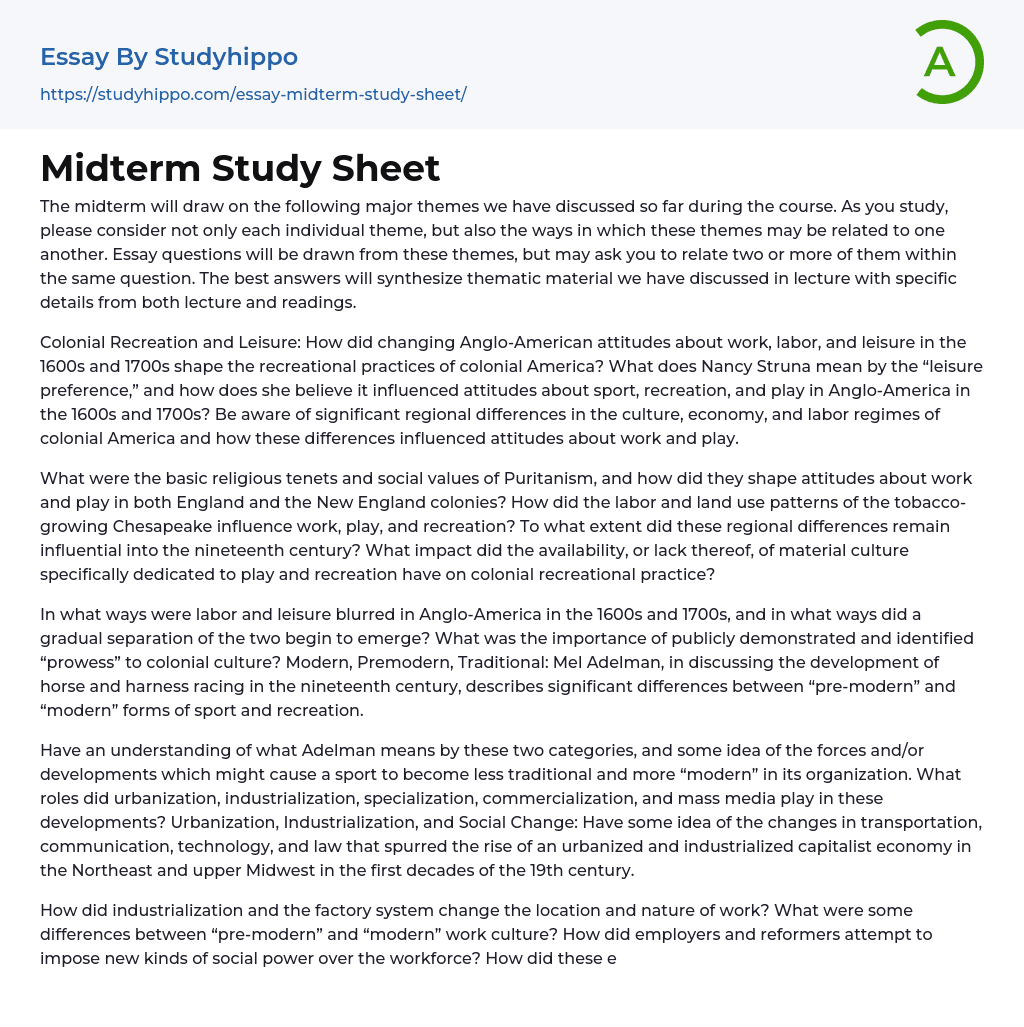The midterm will draw on the following major themes we have discussed so far during the course. As you study, please consider not only each individual theme, but also the ways in which these themes may be related to one another. Essay questions will be drawn from these themes, but may ask you to relate two or more of them within the same question. The best answers will synthesize thematic material we have discussed in lecture with specific details from both lecture and readings.
Colonial Recreation and Leisure: How did changing Anglo-American attitudes about work, labor, and leisure in the 1600s and 1700s shape the recreational practices of colonial America? What does Nancy Struna mean by the “leisure preference,” and how does she believe it influenced attitudes about sport, recreation, and play in Anglo-America in the 1600s and 17
...00s? Be aware of significant regional differences in the culture, economy, and labor regimes of colonial America and how these differences influenced attitudes about work and play.
What were the basic religious tenets and social values of Puritanism, and how did they shape attitudes about work and play in both England and the New England colonies? How did the labor and land use patterns of the tobacco-growing Chesapeake influence work, play, and recreation? To what extent did these regional differences remain influential into the nineteenth century? What impact did the availability, or lack thereof, of material culture specifically dedicated to play and recreation have on colonial recreational practice?
In what ways were labor and leisure blurred in Anglo-America in the 1600s and 1700s, and in what ways did a gradual separation of
the two begin to emerge? What was the importance of publicly demonstrated and identified “prowess” to colonial culture? Modern, Premodern, Traditional: Mel Adelman, in discussing the development of horse and harness racing in the nineteenth century, describes significant differences between “pre-modern” and “modern” forms of sport and recreation.
Have an understanding of what Adelman means by these two categories, and some idea of the forces and/or developments which might cause a sport to become less traditional and more “modern” in its organization. What roles did urbanization, industrialization, specialization, commercialization, and mass media play in these developments? Urbanization, Industrialization, and Social Change: Have some idea of the changes in transportation, communication, technology, and law that spurred the rise of an urbanized and industrialized capitalist economy in the Northeast and upper Midwest in the first decades of the 19th century.
How did industrialization and the factory system change the location and nature of work? What were some differences between “pre-modern” and “modern” work culture? How did employers and reformers attempt to impose new kinds of social power over the workforce? How did these economic changes correlate with changes in political citizenship and public identity in the industrial city? In what ways did they begin to alter the lived nature of time and space? How did they change the relationship between work and leisure?
Be prepared to think about the relationship between these economic, social, and political changes and the kinds of recreational behavior observed in prize fighters, harness racers, and other self-defined sportsmen in the early nineteenth century. How did the emergence of an inexpensive popular press change the relationship between participants and followers
of these sports? In what ways did contemporary political discourse – ideas like republicanism, democracy, aristocracy, and nationalism – influence sport?
In what ways were sport, recreation, and leisure used as forms of public identity, self-definition, and image projection? The Sports Themselves: Have a working knowledge of the primary Anglo-American sport and recreational traditions which formed the basis of nineteenth-century American sports like prize fighting, horse and harness racing, stick-and-ball games, cockfighting and animal baiting, and others. What were the primary location(s) of sporting culture, and to what degree did they change or develop over time? What was the importance of taverns and saloons to sporting culture?
Consider developments in sporting culture which made the location(s) of sporting culture more permanent, more prominent, and/or more commercialized. In what ways was sporting culture related to other consumer, recreation, and leisure cultures in the industrial city? How was it related to a culture of gambling? What were the purposes, other than material profit, of gambling on sporting events? To what degree did regional differences in attitudes about work, leisure, and labor persist into the first half of the nineteenth century?
Be prepared to discuss significant figures in the early history of their sports, a few of whom appear in the ID section, below The midterm will also ask you to identify, and briefly explain the importance of, a few people, places, things, events, or ideas of interest. These ID terms will be drawn from the list below. A good ID response gives a very brief definition of the item (who/what/where/when etc. ) and then describes the significance of the item by tying it into
one or more of the main themes of the course.
- Policy essays
- Public Policy essays
- Totalitarianism essays
- Communism essays
- Conservatism essays
- Liberalism essays
- Marxism essays
- Socialism essays
- Activism essays
- Patriotism essays
- Social Contract essays
- Nationalism essays
- Malala essays
- Collaboration essays
- Dialogue essays
- Fake News essays
- Journalism essays
- Mass Media essays
- Media Analysis essays
- Media Bias essays
- Media Studies essays
- Message essays
- News essays
- Propaganda essays
- Radio essays
- Rogerian Argument essays
- Role of Media essays
- Social Media essays
- Social Media Marketing essays
- Social Networking essays
- Youtube essays
- Absolutism essays
- Appeal essays
- Bourgeoisie essays
- Contras essays
- Corporate Governance essays
- Corruption essays
- Democracy essays
- Democratic Party essays
- Developed Country essays
- Dictatorship essays
- Elections essays
- European Union essays
- Federalism essays
- Foreign essays
- Foreign policy essays
- Gentrification essays
- Hillary Clinton essays
- Income Tax essays
- International Relations essays




